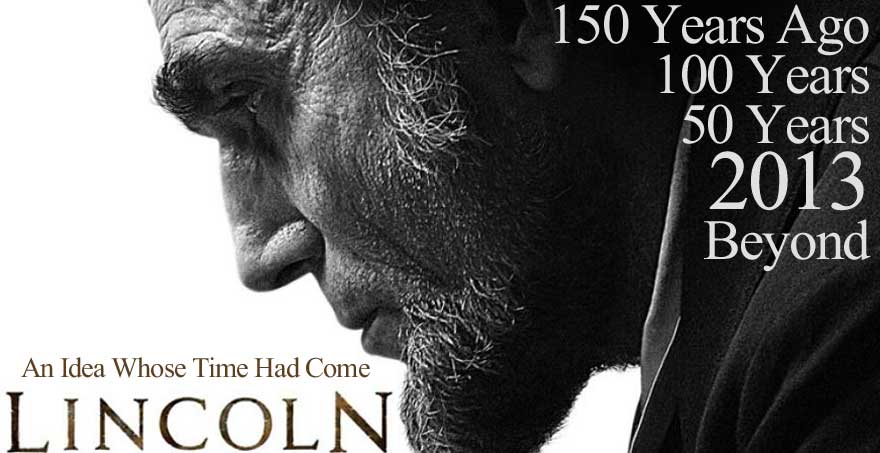|
I went to see the Stephen Spielberg movie, Lincoln, on New Year’s Day, the 150th anniversary of the Emancipation Proclamation.
Turned out the movie was more about President Abraham Lincoln’s resolve and political savvy in leveraging the bloody Civil War into a masterful move to weaken the South morally and economically so as to end both the war and African American slavery. The politics and change it started 150 years ago trickled down to today. And for that, I'm grateful.

True, the Emancipation Proclamation didn’t automatically free America’s 4 million Africans and their descendants who were slaves in the United States. As former federal Judge U.W. Clemon said at his speech during the annual Jan. 1 observance of the historic document at Bethel Baptist in West End, Lincoln’s proclamation was driven more by a strategy to weaken the Confederate state’s economic war engine and potentially recruit Black slaves into the Union Army. It also turned off their potential European allies, he said. After all, no nation with a moral conscience could defend a new country that insisted on perpetuating an old institution that was, in fact, a crime against humanity.
But the Proclamation was the first wave of a sea change that gave hope to millions of hopeless people whose hearts, minds and bodies were degraded daily in an 87-year-old nation that was, as Lincoln said in his famous 1863 Gettysburg Address, “conceived in liberty, and dedicated to the proposition that all men are created equal.”
The Proclamation led to the passage of the Constitution’s 13th Amendment that did eventually free the slaves. Other amendments to the nation’s charter document gave the former slaves the full rights of citizenship, including the right to vote. But the South rose again to cripple those freedoms with a new system called Jim Crow. Essentially, it kept the former slaves and their descendants from enjoying these rights.
But in 1963, exactly 100 years after the Emancipation Proclamation was issued, a decisive battle was waged in a highly unusual “war” in the churches and streets of Birmingham, Alabama, as African Americans struggled to win the long-denied rights of first-class citizenship in a country that once enslaved them.
Most of us know the general story of the 1963 Birmingham Movement, which involved Dr. Martin Luther King, Jr., fire hoses, police dogs and children in the streets of the city 50 years ago this year.
This steel city was known nationally as the deadliest defender of Jim Crow laws and customs. At times, its most racist radicals resorted to bombings, beatings (even a castration), economic reprisals and other intense pressure to resist any form of integration (particularly in schools) and equality for African Americans.
But Birmingham 1963 turned the tide against the Jim Crow system, as the world recoiled in horror when Public Safety Commissioner Bull Connor unleashed dogs and hoses on child protestors, who had taken a dramatic, but non-violent, stand for the freedom to exercise their civil rights.
So on Jan. 1, 2013, as some marked the 150th Emancipation Proclamation, others marked the beginning of the 50th Anniversary of that Movement and its world-changing impact on the tide of human history.
The City of Birmingham and a host of other organizations are planning events throughout 2013 to delve into this past and to discuss the present condition of civil and human rights.
But what I want to see in 2013 – and what I am personally striving to achieve – is a vision for the future that looks back toward the history and lessons of the past 50 to 150 years, and strives to move forward from 2013 and beyond.
What could Birmingham’s future look like?
It will be normal for every Birmingham school student to attend a world-class school, achieving academic and/or athletic success and excellence. Our schoolchildren will be taught to understand the value of civil rights history as part of American history to build positive values of self-worth, self-sufficiency and civic responsibility to all citizens. Our students will be among the best educated workforce in Alabama that will attract more industries and businesses to our region. As former secretary of state Condoleezza Rice mentioned in her recent Birmingham speech, a solid education has to be on the frontier of our nation’s forward progress in the world.
I see a city where African Americans are active, vibrant contributors to the economic engine that drives the state’s still largest populated city. Their untapped workforce talent and entrepreneurial drive, when unleashed, will lead to the creation of inner-city jobs that will eventually end chronic unemployment. That, in turn, will lead to reduced crime and improved neighborhoods. Better schools and better living conditions will attract former and new residents into the city.
This citizenry will elect progressive leaders that protect and enhance Birmingham’s growth by setting long-term goals and policies that secure a better Birmingham 50 to 100 years into the future. These citizens will insist that we establish a viable regional transit system. They will ensure that our public health care system works for all citizens, regardless of their ability to pay. They will work to develop and protect more green space. They will not tolerate any forms of discrimination, not in this city that was once the bastion of racial hatred and bigotry.
I have a Vision. Despite the present circumstances that say otherwise, I believe this potential future is possible and totally within our reach, if only we choose to move toward it.
UAB history professor Pam King has written a number of interesting historical pieces for Weld of Birmingham that talk about the crossroads decisions that thrust Birmingham into the national and world conscious, decisions that have shaped its current reality. From Bull Connor’s decision to let thugs pummel the Freedom Riders into a bloody pulp, or unleash dogs and fire hoses on children. Or the city’s refusal to elect a progressive, who might have been the leader when Dr. King came to join the Alabama Christian Movement for Human Rights in the Birmingham civil rights campaign.
Atlanta enjoys a different destiny because its leaders made savvier decisions. It’s said that Birmingham city leaders’ inaction led an airline company to headquarter its operations in Atlanta rather than here in the ‘50s. Rather than publically fight integration in the ‘60s, Atlanta’s leaders claimed they were “too busy to hate” and focused more on making green than separating Blacks from Whites. That city’s first Black mayor put that rhetoric to the test when he forced business leaders to include minority-owned companies in the 1970’s expansion of Atlanta’s airport and other city projects.
Choices have consequences. Good choices today lead to better outcomes tomorrow. I know I resolve to make better in 2013, because I definitely need better outcomes.
I hope our citizens chose to embrace the lessons of Birmingham 1963 and not forget the past in a headlong rush to move “50 Years Forward.” We ignore the power and purpose of Birmingham63’s history to our future peril if our only concern is to “get past the fire hoses and dogs.”
The world didn’t end on 12-21-2012. Maybe it was the end of an era, a new beginning for the people of this planet to move to another level.
Lincoln did not live to see the eventual fulfillment of the Emancipation Proclamation, or the adoption of 13th Amendment that eventually freed African American slaves. Dr. King did not live to see the Dream he spoke about on the Lincoln Memorial steps some 100 years later.
Today – 50 years after the historic March on Washington D.C., after the Children’s March in Birmingham or the 16th Street Baptist Church bombing that killed four girls and the shootings that took the lives of two boys on the same day in 1963 – we are still waiting for the fulfillment of a notion, that all men are created equal and deserve the necessary liberty to chose to live up to the fullest of their God-given potential.
 America, the experiment, is still on-going. It’s one we need to prove viable as slavery in various forms continues growing worldwide. Let’s take to heart African Sankofa wisdom (symbolized here), where we look over our shoulder to the past and learns from it as we walk forward to a better future, in 2013 and beyond. America, the experiment, is still on-going. It’s one we need to prove viable as slavery in various forms continues growing worldwide. Let’s take to heart African Sankofa wisdom (symbolized here), where we look over our shoulder to the past and learns from it as we walk forward to a better future, in 2013 and beyond.
vickii
More Emancipation Proclamation Details
Metro Birmingham Branch NAACP Commemorates 150th Anniversary of the Emancipation Proclamation
On Saturday, January 5, 2013, the Metro Birmingham Branch NAACP will commemorate the 150th Commemoration of the Emancipation Proclamation at Greater Shiloh Missionary Baptist Church 2135 Jefferson Avenue SW, 35211 at 3:00 p.m.
President Abraham Lincoln's famous executive order is widely acclaimed as the beginning of the principled freeing of the slaves on January 1, 1863.
The featured speaker for the program is Attorney W.L. Williams, Jr., Civil Rights Litigator of the 1963 Civil Rights Movement.
Immediately following the program, the NAACP will host a book signing of "The Gentle Giant of Dynamite Hill," a book about the life and times of Attorney Arthur Shores by his daughters, Judge Helen Shore Lee and Barbara Shores.
For more information contact: Hezekiah Jackson, IV, Metro Birmingham NAACP President, (205) 516-9806
|

